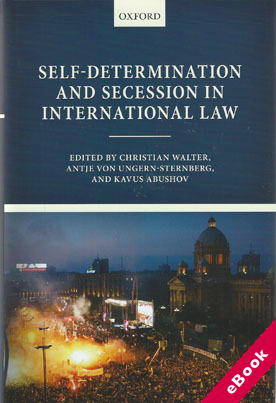
The device(s) you use to access the eBook content must be authorized with an Adobe ID before you download the product otherwise it will fail to register correctly.
For further information see https://www.wildy.com/ebook-formats
Once the order is confirmed an automated e-mail will be sent to you to allow you to download the eBook.
All eBooks are supplied firm sale and cannot be returned. If you believe there is a fault with your eBook then contact us on ebooks@wildy.com and we will help in resolving the issue. This does not affect your statutory rights.
Peoples and minorities in many parts of the world assert a right to self-determination, autonomy, and even secession from a state, which naturally conflicts with that state's sovereignty and territorial integrity. The right of a people to self-determination and secession has existed as a concept within international law since the American Declaration of Independence in 1776, but the exact definition of these concepts, and the conditions required for their application, remain unclear.
The Advisory Opinion of the International Court of Justice concerning the Declaration of Independency of Kosovo (2010), which held that the Kosovo declaration of independence was not in violation of international law, has only led to further questions.
This book takes four conflicts in the post-Soviet Commonwealth of Independent States (CIS) as a starting point for examining the current state of the law of self-determination and secession. Four entities, Transnistria (Moldova), South Ossetia, Abkhazia (both Georgia), and Nagorno-Karabakh (Armenia), claim to be entitled not only to self-determination but also to secession from their mother state. For this entitlement they rely on historic affiliations, and on charges of discrimination and massive human rights violations committed by their mother state.
This book sets out its analysis of these critical issue in three parts, providing a detailed understanding of the principles of international law on which they rely: The first part sets out the contours and meaning of self-determination and secession, including an overall assessment of secession within the Commonwealth of Independent States.
The second section provides case studies investigating the events in Transnistria, South Ossetia, Abkhazia, and Nagorno-Karabach in greater detail. The third and final section extends the scope of the examination, providing a comparative analysis of similar conflicts involving questions of self-determination and secession in Kosovo, Western Sahara, and Eritrea.